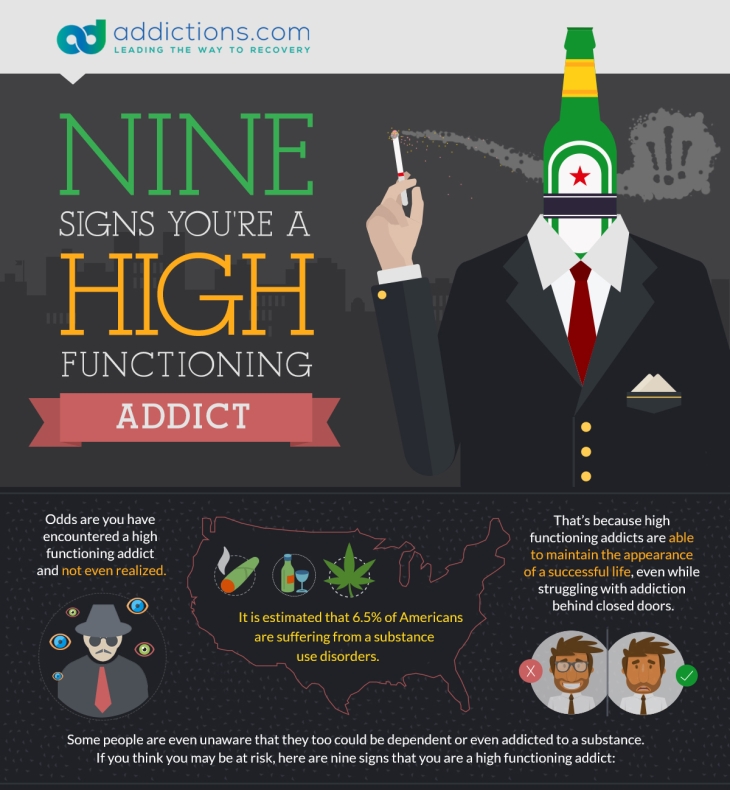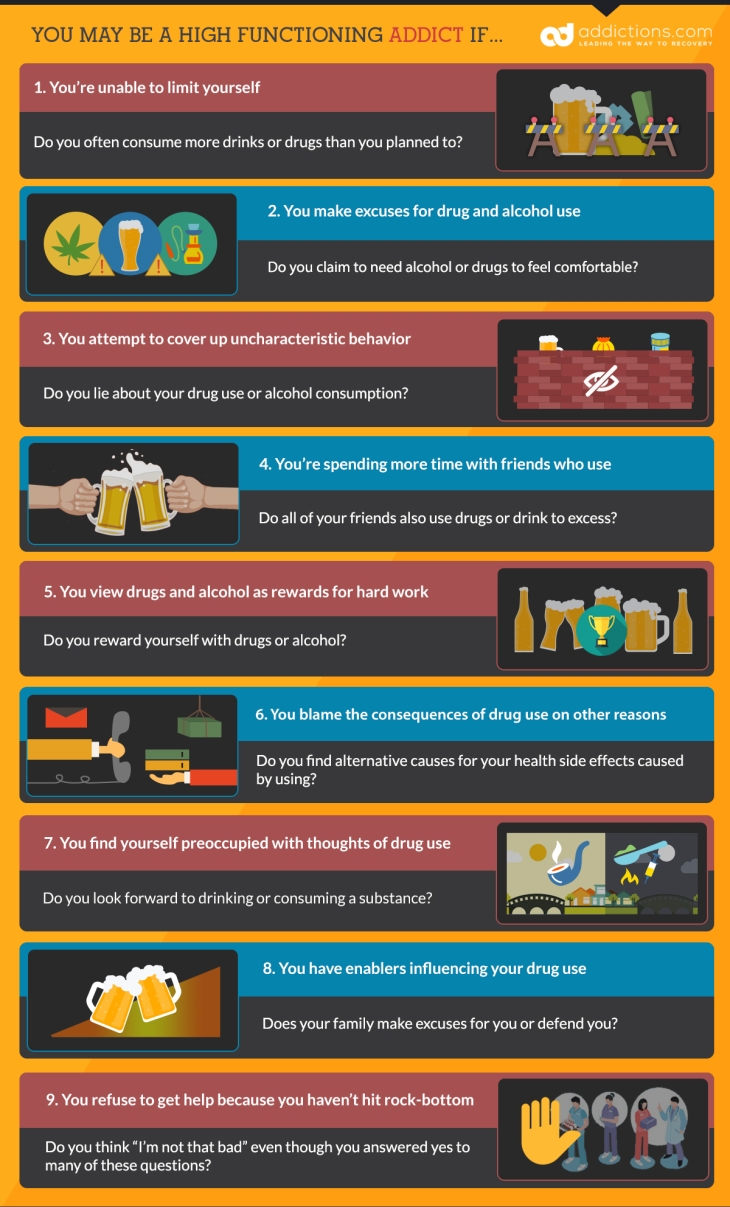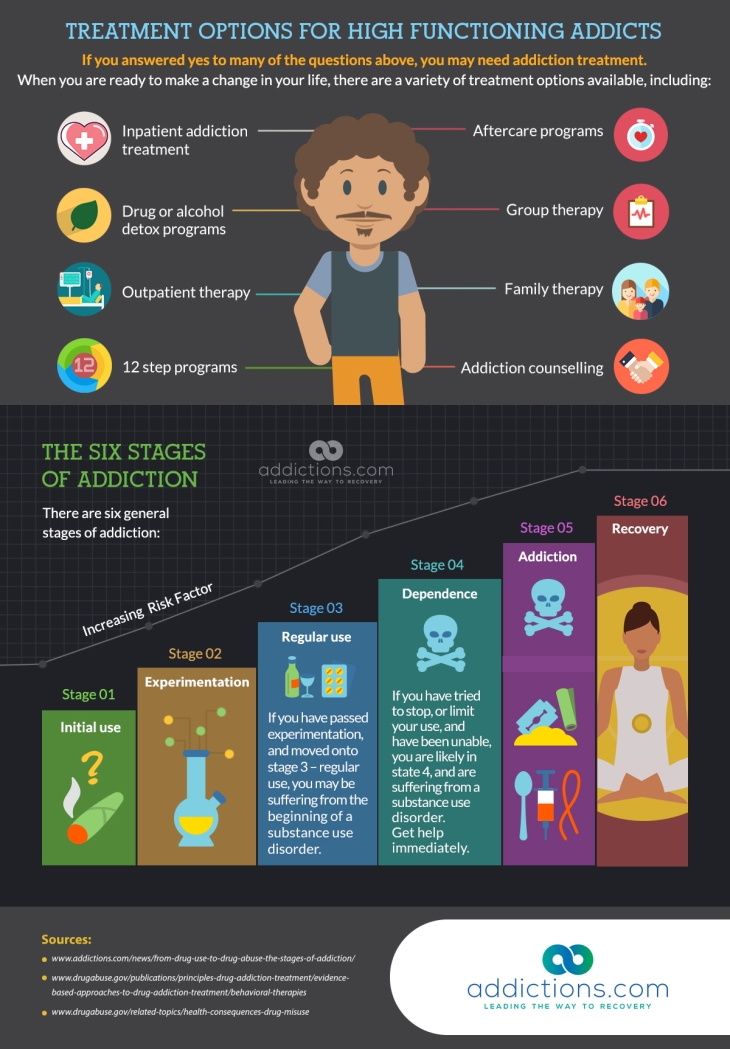Those who suffer from addiction are commonly stereotyped as people who have problems at home, generate low income, and who typically do nothing outside of drinking and using drugs. Typical “addicts” are often assumed to be angry and violent, or heavily drowsy and sedated at any given time. But in reality, addiction affects each person differently — including those who are intelligent, physically active, and have successful careers.
A high-functioning addict is someone who appears to be successful at life in general, but struggles with addiction and its many related problems behind closed doors. These individuals may have great jobs, loving friends and family, and a long list of hobbies and interests, but rely on substances like marijuana and alcohol to make it through the day.

Functioning Addicts: A Hidden Struggle
functioning addicts are individuals who manage to maintain seemingly normal lives despite struggling with addiction. These individuals often excel in their careers, maintain relationships, and fulfill responsibilities while secretly battling substance abuse.
Many times, a high-functioning addict is skilled at hiding their addiction from others, and at navigating daily life without allowing drugs and alcohol to negatively interfere. These individuals tend to be in denial about their substance use disorders, and are unknowingly putting themselves at risk for serious physical and psychological health problems down the road.
Could you or a loved one be a high-functioning drug addict without knowing? Here’s how addiction works, along with nine signs that indicate you may be a functional addict.
Stages of Addiction, and How They Affect People Differently
Addiction doesn’t happen overnight — usually, it takes up to several months or years of substance abuse for someone to get caught up in the cycle of addiction. There are six main stages of addiction: initial use, experimentation, regular use, dependence, addiction itself, and recovery.
After initial use, those who eventually go on to become high-functioning addicts begin experimenting with drugs in social settings, and may start using drugs and alcohol regularly to help them wind down after having taxing, busy days. These regular behaviors can often lead to tolerance and physical dependence. Tolerance is when the brain and body adapt to regular drug use — requiring a person to use higher amounts of drugs and alcohol to achieve the same effects. Physical dependence is when a person requires a certain amount of drugs and alcohol to avoid experiencing withdrawal symptoms.
Addiction occurs when people become physically and psychologically dependent on drugs and alcohol, and require these substances to fulfill cravings and the euphoria they can no longer achieve on their own, naturally. Since addiction occurs gradually over time, high-functioning addicts are able to make minor adjustments to their lifestyles as needed to continue abusing drugs and alcohol while also staying functional and maintaining an overall sense of normalcy.
Addiction is Not One-Size-Fits-All
Addiction can affect anyone, and should never be viewed as a one-size-fits-all condition. People become addicted to drugs and alcohol for different reasons, under varying circumstances. For instance, a professional athlete can suffer an injury and unintentionally become addicted to painkillers after misusing their medication. Or, a university student could start using stimulants like Adderall to improve their focus and concentration so they can achieve better grades in school. A high-profile criminal attorney may start abusing benzodiazepines to self-medicate for depression and anxiety, and to help themselves sleep better at night.
It can be difficult to spot a high-functioning drug addict, since these individuals are expert at showing the outside world that they are happy, and that they can maintain successful professional lives and relationships. But as time goes by, these individuals eventually start experiencing the negative effects of addiction, regardless of how well they’re trying to manage their condition.
9 Signs You May Be a High-Functioning Drug Addict
Addiction is considered a chronic brain disease, and when left untreated, can eventually lead to financial problems, domestic problems, worsened health, and a lower quality of life. Knowing the signs of a high-functioning addict can help you determine whether it’s time for you or your loved one to get help in the form of professional addiction treatment.
Here are nine signs that indicate you may be a high-functioning addict.
1. You’re Unable to Limit Yourself
As you continue using drugs and alcohol regularly, you may find it increasingly challenging to control and limit your use. For instance, you may plan on limiting yourself to only three alcoholic beverages or one joint of marijuana, but end up exceeding these limits over the course of the night.
You may be a high-functioning addict if you notice that your consumption of drugs and alcohol is gradually increasing, and you’re unable to stick to limits you set for yourself. Frequently experiencing blackouts or memory loss can also indicate you’re a high-functioning addict — especially if you’re able to resume life as normal following these incidents.
2. You Make Excuses for Drug and Alcohol Use
High-functioning addicts will often look for excuses to justify drinking and drug use. For instance, someone who works in politics may say they need to consume alcohol at important work parties and events to win over new supporters. You may be a high-functioning addict if you’re constantly making up excuses for your drug use, or find yourself in denial about your addiction.
The District of Columbia, which is the number one drug addicted state in America, is populated with successful and high-profile professionals who commonly consume drugs and alcohol at special events and parties. Experts say many business professionals tend to use special events as crutches when explaining drug and alcohol use, and could be considered prime examples of high-functioning addicts.
3. You Attempt to Cover Up Uncharacteristic Behavior
Drugs and alcohol often cause people to demonstrate uncharacteristic behavior, depending on the substance being used. For instance, those who abuse alcohol and opioids may exhibit slurred speech and lack of coordination, while those who abuse club drugs like MDM or Ecstasy could display unusually friendly and warm behavior.
High-functioning addicts will often look for valid ways to explain their uncharacteristic behaviors. They may blame the effects of opioids and benzodiazepines on simply being overly tired and fatigued, or they may blame the aggression triggered by cocaine on being angry and upset about something that happened at work. If you find yourself lying about how drugs are not the root cause of your uncharacteristic behavior, you may be a high-functioning drug addict.
4. You’re Spending More Time with Friends Who Use
Those who suffer from addiction tend to spend more time with other people who also use drugs and alcohol. Spending time with friends who also use substances can negate feelings of isolation and loneliness commonly associated with addiction, and make people feel less guilty about their drug use. Take note of the people you’ve been spending more time with lately, and determine whether these individuals are negative influences driving your addiction.
5. You View Drugs and Alcohol as Rewards for Hard Work
Mothers may treat themselves to a bottle of wine at the end of the night to reward themselves for making it through another busy day of homework and childcare, while top-level executives may abuse painkillers after stressful conference calls and meetings to reward themselves for a job well done. You may be a high-functioning addict if you’re frequently using drugs and alcohol to reward yourself for various reasons.
6. You Blame the Consequences of Drug Use on Other Reasons
Many high-functioning addicts can successfully manage their everyday lives while suffering from addiction. But at some point, addiction catches up and triggers countless other issues that lead to more serious problems. You may be a high-functioning addict if you find yourself blaming the consequences of drug and alcohol use on other reasons, such as being overworked or too stressed out to think clearly.
For example, a mother high on marijuana may forget to pick up her children from school, or forget to attend parent-teacher conferences that are crucial for her children’s education. Instead of acknowledging that marijuana use may have contributed to poor memory, this mother may say that she’s been too tired or busy with household chores to remember these important times and dates.
7. You Find Yourself Preoccupied With Thoughts of Drug Use
Generally, those who suffer from addiction spend ample amounts of time thinking about drug use. They may entertain themselves with thoughts about using these drugs in social settings, or worry about how and when they can obtain more drugs. If you’re at work, spending quality time with family, or engaging in your favorite activities, yet find yourself constantly thinking or obsessing about drugs, it’s possible you’re a high-functioning addict suffering from addiction.
8. You Have Enablers Influencing Your Drug Use
Enablers are those who take responsibility for your drinking and drug use, and make excuses to defend you from your addiction. Enabling can either be intentional or unintentional, and often occurs when your loved ones want to protect you, your feelings, and your overall well-being — even if they themselves are unaware you might be struggling with addiction. Enablers will allow you to keep abusing drugs and alcohol while covering up your behavior, and willingly accept the blame and consequences brought on by your addiction.
Many times, high-functioning addicts have enablers in their lives in the form of spouses, children, and best friends who may rely on them financially or as caretakers, and who want to avoid rocking the boat in regards to their alcohol and drug use. For instance, a wife and stay-at-home mom who manages several children may encourage her husband to drink if she knows that alcohol helps him manage stress associated with his job. A wife who allows her husband to consume alcohol may be seeking the peace of mind needed to feel financially and emotionally secure.
9. You Refuse to Get Help Because You Haven’t Hit Rock-Bottom
Since addiction tends to carry a stigma, those who contradict the stereotype of a typical “addict” often refuse to get help for substance use disorders. Because they haven’t hit rock-bottom or lost everything important in their lives, most high-functioning addicts feel that they do not have a serious problem with addiction. But at the end of the day, addiction is just as harmful to high-functioning addicts as to any other person, and should be professionally treated at a drug or alcohol rehab center.
Addiction Treatment Options
High-functioning addicts have countless treatment options when it comes to fighting addiction as a whole. Addiction treatment centers guide patients through overcoming physical dependence on drugs and alcohol, and offer a range of therapies that treat the psychological causes behind one’s addiction. High-functioning addicts who also manage jobs, school, and family can benefit from knowing that most addiction treatment centers will customize treatment plans in ways that best align with their patients’ lives.
Inpatient drug rehab is one of the most ideal treatment options for high-functioning addicts. At inpatient rehab, patients live at the facility for the duration of treatment and have 24/7 access to doctors, nurses, and counselors devoted to guiding them safely through withdrawal. Treatment begins with drug and alcohol detox, followed by therapies that address the root causes of addiction.
At drug rehab centers, high-functioning addicts learn new skills and healthier coping methods for handling stress, depression, and anxiety without relying on drugs and alcohol. Patients are also introduced to hobbies and interests that not only replace drug use, but that are proven effective at encouraging sobriety. For instance, art, music, and exercise therapies can naturally help reduce stress, and can distract one’s mind from thoughts of drug and alcohol use.
While high-functioning addicts may be successful in their lives, abusing drugs and alcohol long-term increases the risk for serious health problems including mental health conditions, heart and lung disease, and cancer. Later in life, these individuals also face a higher risk for problems involving finances and law enforcement. Getting help for addiction now can greatly reduce the likelihood of these consequences, and allow you or your loved one to get back to living a healthier and more honest, fulfilling life.
Breaking Free: Addiction Treatment Options in the US
Millions in the US grapple with addiction to alcohol, drugs, or both. This complex issue, causing physical and psychological dependence, needs a multifaceted approach to recovery. Thankfully, a range of treatment options exist.
Breaking the Cycle:
- Detoxification: Specialized facilities offer safe, medically supervised environments to manage withdrawal symptoms during the initial detox phase.
Addressing the Root:
- Therapy & Support: Therapists help individuals develop tools to cope with cravings and improve life skills. Support groups foster a sense of community and accountability, preventing relapse.
Long-Term Recovery:
- Doctors: Medical professionals create personalized plans addressing both physical dependence and underlying mental health issues.
By combining these elements, individuals can achieve lasting recovery. Help is available – break free from addiction and reclaim your life.



